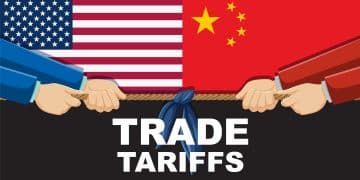Microsoft Epic Games Apple lawsuit explained: Updates, impacts, and what it means for gaming tech

Anúncios
The Microsoft Epic Games Apple lawsuit challenges Apple’s 30% commission on in-app purchases, potentially reshaping the gaming industry by impacting developer rights and consumer choices.
The Microsoft Epic Games Apple lawsuit has stirred significant debate in the tech world. What does this mean for competition and innovation in gaming? Let’s dive in!
Anúncios
Background of the Microsoft Epic Games Apple lawsuit
The background of the Microsoft Epic Games Apple lawsuit is rooted in a complex web of business practices and market dynamics.
This legal battle began when Epic Games, popular for its hit game Fortnite, decided to challenge Apple’s stringent App Store policies.
Epic argued that Apple’s 30% commission on in-app purchases is monopolistic. The case revolves around whether Apple has a monopoly on the distribution of apps on its platform, making it hard for competitors to thrive.
This lawsuit is not just about Epic but sets the stage for how big tech companies operate in the future.
Anúncios
Key events leading to the lawsuit
Several key events have driven the escalation of this lawsuit.
- In August 2020, Epic introduced an alternative payment system in Fortnite.
- Apple responded by removing Fortnite from the App Store.
- Epic filed a lawsuit against Apple within hours.
- The case highlighted concerns about app store policies across the tech industry.
This legal challenge has broad implications for many companies operating in the digital marketplace. Both sides present compelling arguments regarding fairness in business and innovation.
The tech world is closely watching as this case unfolds. The outcome could reshape the relationship between developers and platform holders.
It raises questions like: Will developers be able to bypass the established payment practices? How will it affect the future of app distribution?
Broader implications for the tech industry
Beyond just gaming, this lawsuit hints at larger issues within the tech ecosystem.
- Potential changes in how app stores operate.
- Effect on pricing strategies for developers.
- Increased competition among app platforms.
The ripple effects of this case could lead to enhanced regulatory scrutiny on tech giants, pushing them towards more transparent business practices.
As the case progresses, many will be eager to see what changes may come in the relationship between tech companies and their users.

Players involved in the legal battle
Understanding the key players involved in the legal battle is essential to grasp the dynamics at play in the Microsoft Epic Games Apple lawsuit.
This case features major companies that significantly impact the technology and gaming industries.
At the center of this controversy are three primary entities: Microsoft, Epic Games, and Apple. Each has its own motivations shaped by their business models and market positions.
Microsoft’s role
Microsoft is a major player in the tech realm, particularly known for its Windows operating system and gaming platform, Xbox.
It’s invested in promoting a more open ecosystem for developers. Microsoft has supported Epic Games through this lawsuit by criticizing Apple’s tight grip on the App Store.
Epic Games’ perspective
Epic Games, the creator of Fortnite, seeks to challenge Apple’s 30% commission on in-app purchases.
They argue that such fees are unfair and inhibit innovation. This lawsuit is part of Epic’s larger vision to ensure more flexible rules across app stores.
Apple’s defense
Apple defends its policies by stating that the App Store offers a secure platform for users. The company argues that the 30% fee is necessary for maintaining quality and safety.
Apple believes that compliance with its rules protects consumers from unregulated content.
Other stakeholders
While Microsoft, Epic Games, and Apple are the main players, the lawsuit affects various stakeholders:
- Other game developers who face similar app store policies.
- Consumers who use apps and may face changes in pricing.
- Regulators overseeing fair competition in the tech industry.
The outcome of this legal battle could have lasting repercussions, not just for these companies but also for the broader market landscape.
Many companies are watching closely as the implications could reshape industry practices.
Impacts on the gaming industry
The impacts on the gaming industry resulting from the Microsoft Epic Games Apple lawsuit are significant and will likely shape the future of gaming.
This legal dispute is stirring discussions about how games are sold and the ecosystems developers must navigate. One major implication is the potential shift in revenue models.
If Epic Games wins, it could allow developers to bypass high fees charged by app stores. This change might encourage more independent developers to enter the market, fostering innovation and competition.
Possible outcomes for developers
If the lawsuit changes the rules, developers might enjoy new opportunities:
- Lower fees: Developers could keep a larger share of their earnings.
- Alternative payment methods: More options could be available for in-game purchases.
- Improved relations: A more balanced relationship between developers and platform owners.
These potential changes may alter how games are marketed and sold. Consumers may benefit from increased competition, leading to better prices and more choices.
As more players enter the market, there could be an explosion of creativity in game design.
Regulatory reactions
The lawsuit’s outcome may prompt regulators to take a closer look at the practices of major tech companies.
Lawmakers may introduce new regulations that impact how app stores operate, further reshaping the gaming landscape.
As these developments unfold, the gaming industry is at a crossroads. Companies are evaluating their strategies while keeping an eye on the trial.
The legal battle could set precedents that resonate far beyond just gaming, influencing technology sectors at large.

Legal precedents and future implications
The legal precedents and future implications stemming from the Microsoft Epic Games Apple lawsuit are critical for understanding how technology companies will operate in the future.
This case is unique as it challenges established norms in the app marketplace. Legal precedents may arise from this lawsuit, impacting how courts view monopolistic practices.
If Epic Games succeeds, it could open the floodgates for other developers to contest similar practices by big tech companies.
For example, smaller companies may feel empowered to challenge unfair fees or restrictions.
Significant legal outcomes
Several outcomes could set important legal precedents:
- Definition of Monopoly: Courts may clarify what constitutes a monopoly in the tech sector.
- Rights of Developers: Developers might gain more rights concerning pricing and distribution.
- Policy Changes: Possible revisions to app store policies to promote fairness.
These changes could affect many players in the industry, from indie developers to major platforms.
The potential for significant shifts in the market structure could influence the dynamics of competition.
Impact on consumer choices
If courts rule in favor of Epic Games, consumers may benefit from increased choices. Lower fees could lead to better pricing on games and in-app purchases.
Additionally, a more competitive environment might foster greater innovation in gaming.
Overall, the lawsuit is more than just a dispute between companies; it could reshape the entire landscape of the gaming industry and beyond.
As legal discussions evolve, the precedent set here will likely inform future cases involving technology giants.
Public response and community reactions
The public response and community reactions to the Microsoft Epic Games Apple lawsuit have been mixed and highly engaged.
Gamers, developers, and tech enthusiasts are closely following the proceedings, as they see it as a fight for their interests in the gaming industry.
Many in the gaming community have rallied behind Epic Games. Supporters argue that Epic’s push against Apple’s fees will lead to a fairer marketplace.
This aligns with a growing sentiment that big tech companies need to be held accountable. Social media platforms are buzzing with discussions and opinions on the matter.
Community support for Epic Games
Community reactions often display strong support, as gamers feel empowered by Epic’s actions. Some key points of support include:
- Lower Costs: Gamers want to see reduced prices for games and in-app purchases.
- More Choices: The community hopes this lawsuit will lead to products from a wider variety of developers.
- Industry Change: Many believe these actions will prompt change in how app stores are managed.
This support has led to increased visibility for Epic Games. Hashtags like #FreeFortnite have gained traction across social media, showcasing fan loyalty and enthusiasm.
Criticism of apple
On the other hand, some voices criticize Apple’s business practices. Many consumers express frustration over the 30% fee, which they see as excessive.
Critics argue that this model stifles innovation and limits choices for consumers. Overall, the lawsuit has ignited passionate discussions among gamers and the tech community.
The ripple effects of this case may influence not only how tech companies interact but also how consumers feel about their purchasing power in the gaming industry.
FAQ – Frequently Asked Questions about the Microsoft Epic Games Apple Lawsuit
What is the main issue in the Microsoft Epic Games Apple lawsuit?
The main issue is whether Apple’s 30% commission on in-app purchases is monopolistic and harmful to developers.
How could this lawsuit affect game developers?
If Epic wins, it may lower fees and allow developers more freedom in pricing and distribution.
What are community reactions to the lawsuit?
Many gamers support Epic, believing it will lead to a fairer and more competitive marketplace.
What could be the long-term implications of this lawsuit?
The outcome may set legal precedents that influence how tech companies operate and affect app store policies.





